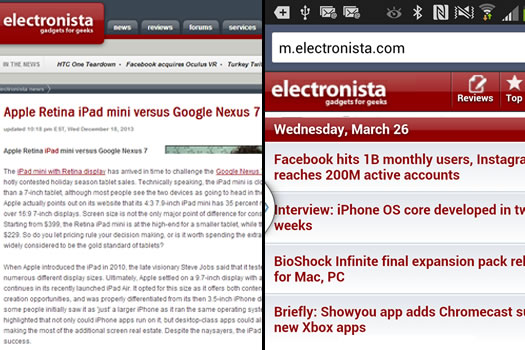
In June of 2013, Pierre Far from Google explained that providing a poor mobile experience could impact a site’s rankings in the smartphone search results. Basically, if a site is making mistakes with how it is handling mobile visits, then that site risks being demoted in the search results when users are searching from their smartphones. And as smartphones boom, that message scared a lot of people.
Specifically, Pierre listed two common mistakes that could cause a poor user experience. First, having faulty redirects could force users to irrelevant content, or to just to the mobile homepage of a website. For example, imagine searching for a specific product, service, review, blog post, etc., and finding that in the search results. But as you click through, the site redirects you to the mobile homepage. That sounds really annoying, right? But it happens more than you think. And that’s especially true since the problem is hidden for desktop users.
But that June day in 2013 passed, and businesses moved on. Sure, mobile is important, it’s taking over, blah blah blah. In addition, I’m sure many wondered if Google would really demote a site in the smartphone search results. I mean, why move a powerful site like yours down in the results when your pages really should rank highly (like they do on desktop)? Google would probably only do that to low quality sites, right?.. I think you see where I’m going with this.
Faulty Redirects – An Example Caught in the Wild
Last week, I was checking Techmeme for the latest technology news and clicked through an article written by Electronista. I forget which story the article was about, but Electronista was listed first for the news at hand. So I clicked through and was immediately redirected to the mobile homepage. I navigated back to Techmeme, clicked the listing again, and was promptly redirected again. So I visited another site listed for the story on Techmeme and got the information I was looking for.
*ALERT* – That’s exactly the user experience Google is trying to avoid happening to people searching Google. And that’s one of the core scenarios that Pierre listed that could result in a rankings demotion. So that got me thinking. What about other pages on Electronista? Were they also redirecting mobile users to the mobile homepage? And if this problem was widespread, were they being demoted in the smartphone search results? And so I dug in.
Side note: I’m not targeting Electronista by writing this. Actually, I hope this post helps them. I can only imagine that if they fix the problem, then their traffic from smartphone users on Google will skyrocket.
An Example of a Faulty Redirect on Electronista
I’m sure you are wondering how this looks. Here’s a quick example. Let’s say I was researching a Nexus 7 tablet and comparing it to an iPad mini. Electronista has an article focused on that topic. On desktop or tablet, I visit that url and can view the entire post. But on my smartphone, visiting that url redirects me to the mobile homepage (via a 302 redirect).
Desktop URL resolves correctly:

When searching on my smartphone, the site incorrectly redirects me to the mobile homepage:

Here is the 302 redirect in action:
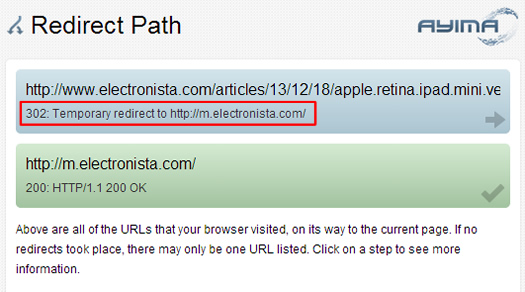
Examples of Demoted Smartphone Rankings
Electronista.com has 143K pages indexed in Google. And every url I checked on my smartphone is redirecting to the mobile homepage. So it wouldn’t take Google very long to pick up the problem, and across many pages on the site. But now I needed evidence of rankings being demoted based on this problem.
So I fired up SEMRush and checked the organic search reporting for Electronista.com. I started picking keywords that the site ranked highly for (on page 1 on Google). Then I started searching on my desktop and smartphone using Chrome for Android (incognito mode). And low and behold, I noticed the problem almost immediately. Smartphone rankings were either much lower or non-existent for content that was ranking highly on desktop. Almost all of the keyword/ranking combinations I checked revealed the demotion in the smartphone search rankings.
Note, not every Electronista listing was being demoted. There were a few outliers where the page still ranked well (as well as it did on desktop search). But the user experience was still horrible. I was redirected to the mobile homepage and forced to fend for myself. Needless to say, I wasn’t going to start searching the mobile site for the url I expected to see. I just bounced. And again, Google doesn’t want its users to have to deal with this situation. Instead, Google will just demote the search rankings on smartphones.
A picture is worth a thousand words, so let’s take a look at some examples. Below, I have provided screenshots of the demotion in action. You’ll see the desktop search results first and then the smartphone search results below that.
Red Camera For Sale (ranks #8 on desktop and N/A on smartphone)
Desktop search results:

Mobile search results:

LTE Microcell (ranks #10 on desktop and N/A on smartphone)
Desktop search results:

Mobile search results:

HTC Vivid Radar (ranks #3 on desktop and #20 on smartphone)
Desktop search results:
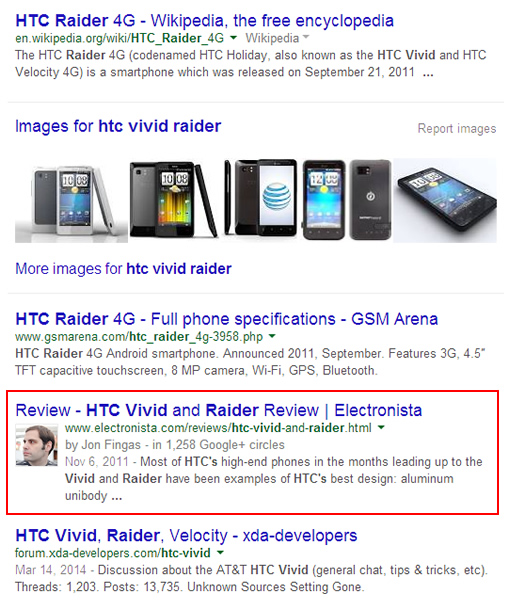
Mobile search results:
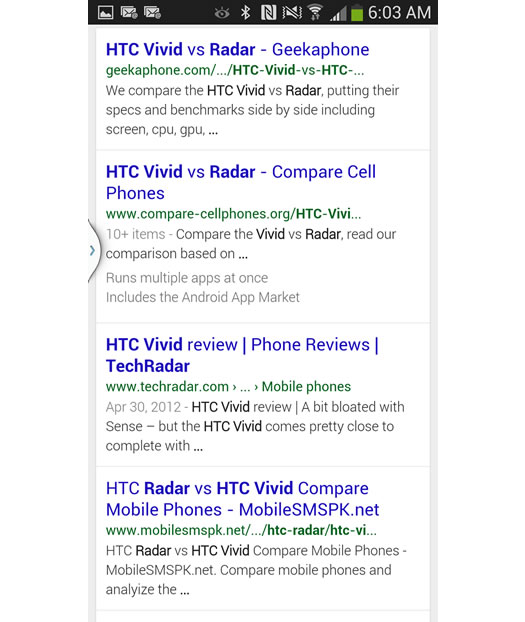
Google Nexus 7 Versus ipad mini (ranks #8 on desktop and #18 on smartphone)
Desktop search results:
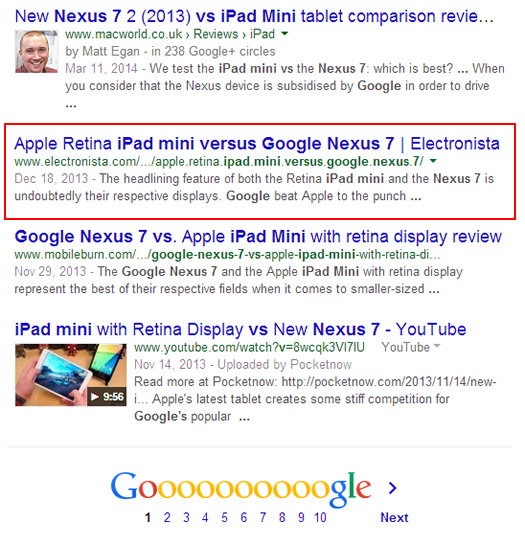
Mobile search results:
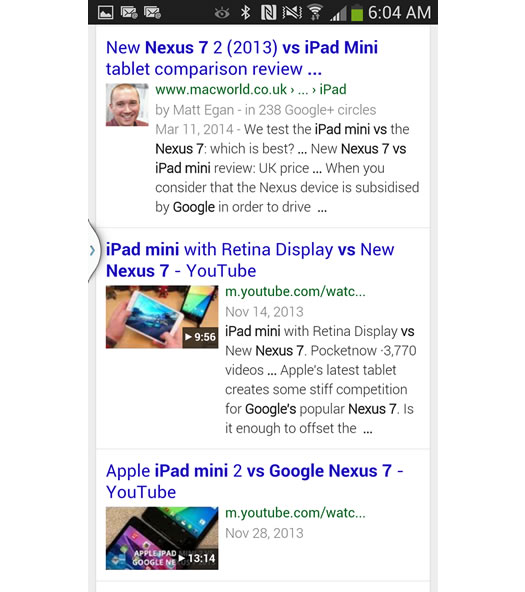
Skullcandy Pipe Review (ranks #5 on desktop and #10 on smartphone)
Desktop search results:

Mobile search results:

And here are a few where the rankings were not demoted. They should be demoted, but they weren’t (at least for now):
Commodore 64 remake
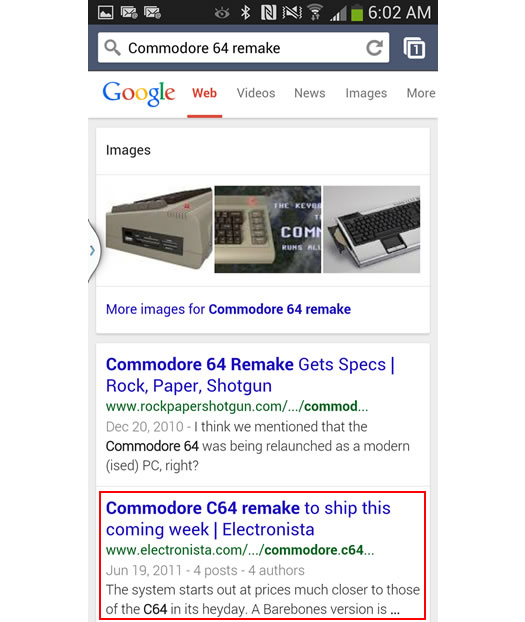
Windows 8 touch screen requirements
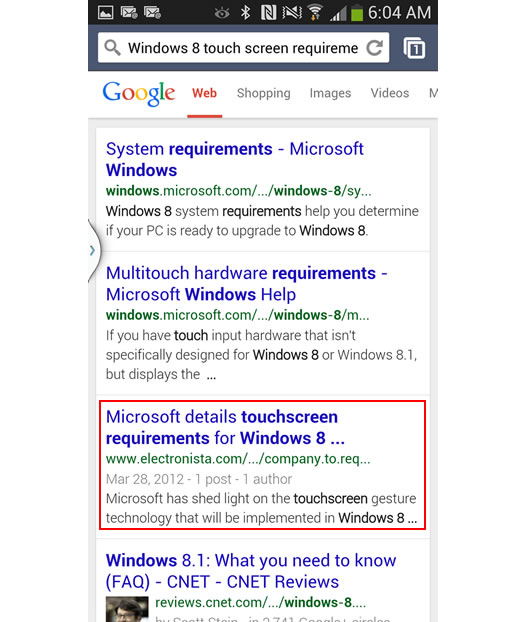
How To Avoid Demoted Smartphone Search Rankings (Listen up Electronista)
The solution to this problem is fairly straightforward. If you are using separate webpages for mobile content, then you should redirect your desktop pages directly to the mobile url for that content. Do not redirect all requests from smartphones to the mobile homepage. As Google explains, “This kind of redirect disrupts a user’s workflow and may lead them to stop using the site and go elsewhere.” And by the way, Google also says that it’s better to show smartphone users the desktop content versus implementing a faulty redirect to the mobile homepage. I completely agree.
In addition, make sure you use rel alternate on your desktop pages pointing to your mobile pages. And then use rel canonical on your mobile pages pointing to your desktop pages. You can read Google’s documentation for handling various mobile setups here.
Update: Pierre Far from Google provided some feedback based on reading this case study. I asked Pierre how quickly Google would remove the demotion once the redirect problem was fixed. Here is what Pierre said:
“When a fix is implemented, we’d detect it as part of the usual crawling and processing of each URL.”
So, it seems that once the redirects are corrected, Google will detect the proper setup as it recrawls the site. As it does that, the pages should return to their normal rankings. If Electronista makes the necessary changes, I’ll try and figure out how quickly their smartphone rankings return to normal. Stay tuned.
Avoid Smartphone-only Errors
I covered faulty redirects and the impact they can have on search rankings, but there’s another scenario that can get you in trouble. Google also explains that smartphone-only errors can also result in demoted smartphone rankings. And in my experience with auditing websites, these types of errors can go unnoticed for a long time.
For example, if you incorrectly handle Googlebot for smartphones, then you could incorrectly present error pages to users. In addition, the code that handles mobile pages could be bombing, which would also present errors to smartphone users. Needless to say, I highly recommend testing your setup thoroughly via a number of devices, checking your site via mobile emulators, and crawling your site as Googlebot for smartphones. The combination will often reveal problems lying below the mobile surface.
Note, Google Webmaster Tools also recently added smartphone crawl errors. The report provides a wealth of information about the errors that Googlebot for Smartphones is running into. And that includes server errors, 404s, soft 404s, faulty redirects, and blocked urls. I highly recommend you check out your reporting today. You never know what you’re going to find.
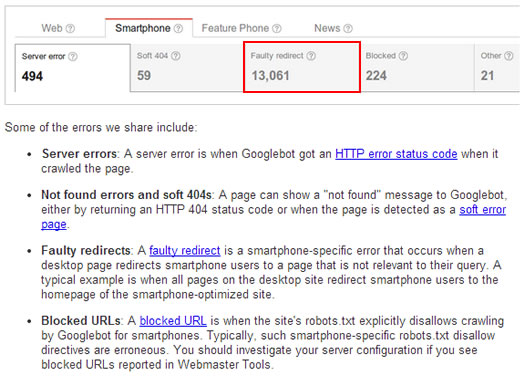
Summary – Turning Demotions into Promotions
As mobile booms, more and more people are searching from their smartphones. Google is well aware of the problems that mobile users can face while searching for, and viewing, content on their phones. And in response to those problems, Google will demote your rankings in the smartphone search results. Electronista is currently implementing faulty redirects, and based on that setup, its rankings are being heavily demoted. Don’t let this happen to you. Check your setup, view your reporting in Google Webmaster Tools, and then quickly fix any problems you are presenting to mobile users. Think of all the traffic you might be losing by not having the right mobile setup in place. The good news is it’s a relatively easy fix. Now fire up those smartphones and visit your site. :)
GG

Glenn, great post (as usual). It amazes me that people aren’t more careful with redirects. That being said I’ve made plenty of mistaken redirects in my time on the Web. But if it’s important like this I always double check.
Thanks Seth! This was a crazy example that I stumbled across last week. Once I saw how large of a problem it was, I had to dig in and analyze it. The good news for Electronista is that it’s a quick fix. And I’ll be posting an update shortly based on feedback from Google’s Pierre Far.